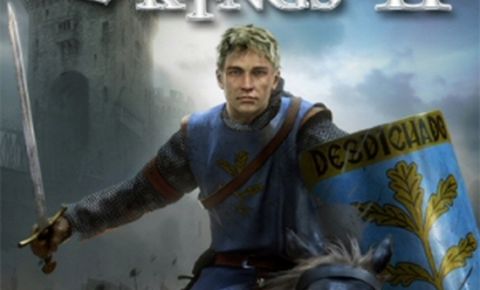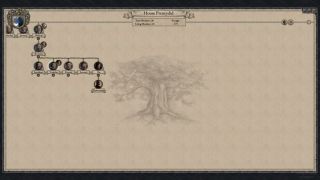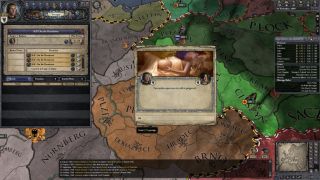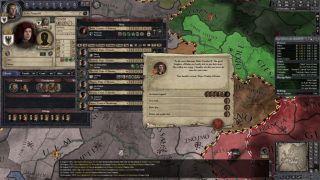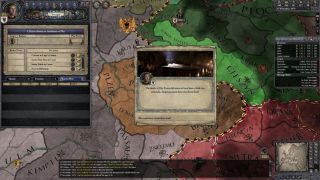Let me tell you about the time I murdered my brother. I was playing the leader of Bohemia, Duke Vratislav the Second in the excellent Crusader Kings II, enjoying life on the edge of the Holy Roman Empire and in the middle of Europe, scheming about ways to expand my network of vassals while acquiring some more wealth. Then my brother’s wife plotted to kill one of my small sons, something I could not accept.
Rather than simply telling her to drop the plot so that I can forgive the whole sordid affair, I decided to imprison her, something that Ota, my brother and her husband, found hard to swallow. Relations between us quickly went down to -100, which pretty much meant that at some point he was going to betray me and rise up in open revolt.
So I created a plot to kill Ota rather than simply remove his title for the Olomuc region, and I also invited a number of other power players in my dukedom, including at least one bishop, to join me.
Some refused, some decided to join my scheme and, in 1074, I killed my brother Ota, removing one of the biggest threats to my power, without alerting the rest of my family. I would have bragged but I feared that they would have become pretty annoyed to hear about the own potential faiths.
Power base solidified, I now plan to marry off one of my sisters to the Duke of Bavaria, in order to expand my relations and gain some prestige. She’s about 11 at the moment.
These are the kind of stories and situations created in Crusader Kings II and, for those who have the time and attention resources, they can become some of the most interesting moments of gaming in 2012.
Gameplay
Crusader Kings II, developed and published by Paradox Interactive, is a grand strategy game that allows a gamer to pick any political entity in the European world starting with the momentous date in 1066 when the Battle of Stamford Bridge took place and then to control its fate through the centuries, guiding it toward success or failure, glory or defeat.
The template sounds similar to that of Europa Universalis III, but the two games offer a very different experience because of their focus. EU III is a game about nations and territorial expansion while Crusader Kings II offers an experience focused on characters, on the kings, counts, barons, ladies, bishops, courtesans and mercenaries who made the medieval world interesting.
The player gets control over the affairs of the fiefdom he selects and the first order of business is to fill a loyal council of five positions that helps the administrative tasks. As time rolls on gamers can launch plots, invade enemies, go on actual Crusades against the unbelievers, gain and lose friends and can expand or lose territory. Everyone eventually dies but the game continues as long as the dynasty has a viable heir.
Crusader Kings II plays very differently depending on what kind of character the player chooses to control. Those who get a king position from the start of the game will have more options when dealing with other countries and characters and will get more decisions to explore during a typical year.
Those aiming for the lowly count characters will need to scheme in order to gain a better position before trying to become kings on their own and will have to be careful not to attract the wrath of bigger powers.
The focus on persons rather than nations in Crusader Kings II is clear in the way the character system is developed. Everyone gets a rating linked to diplomacy, stewardship, learning, intrigue and military and health, fertility, religion and cultural attributes also play an important role.
As the game progresses and a character acts in the game world, he will also gain traits, ranging from proud or brave to zealous and stutterer. The career that each person chooses also leads to more traits and attribute changes later in life. There are stories encapsulated in each character the player can interact with, although most of them will remain untold.
In addition, each character in Crusader Kings II amasses wealth, prestige, piety with the Church, all of which can be used to perform actions. All the stats then combine to create complex situations, with lowly characters trying to get ahead while the already powerful try to keep their position and expand their dominions.
There are times in Crusader Kings II when nothing much seems to happen and time just sprints by and moments when plots, wars, successions and births take place in the space of just one year to significantly change the face of Europe and the nature of the game.
Novices might feel overwhelmed by the quick pace of events and this is a game where failure can be quick and spectacular. It is important to know one’s limits when playing Crusader Kings II. I was often brash and aggressive in my expansion, coveting more titles or more land, and was almost always swiftly punished for this.
Most Paradox Interactive games have some sort of limitation for the “snowball effect” (one country getting to a point where no one else can stop it) and they are clearer here than ever in this game. A good player needs to solidify his power base, keep good relations to all those below him and the church and only then look around for weakened competitors that can be preyed upon.
Actual knowledge of history helps when playing Crusader Kings II, especially when it comes to choosing a realm to lead, but it is not a prerequisite and the development team at Paradox Interactive has helpfully introduced Wikipedia links for all real world monarchs in the game, which makes this video game an excellent learning tool for everyone who wants to know more about the murky, violent and faith-dominated world of Medieval Europe and its fringes.
Graphics and audio
The current engine that Paradox Interactive uses, called Clausewitz, has managed something that seemed impossible a few years ago: it has made deep-strategy games look good. And Crusader Kings II, the most recent application of the tech, might just be the best way to attract someone to the genre by showing them pretty, flowing maps and detailed characters.
The fact that, unlike Hearts of Ion III or Europa Universalis, Crusader Kings II focuses on a much smaller piece of medieval real estate means that there’s more detail on the map and that it’s easier to stay zoomed in and slide around looking at provinces while dealing with the rest of the world via the minimap.
There’s a certain charm to the way towns and provinces are depicted, but at the same time the User Interface designer has managed to cram a lot of information into some very tight spaces although less experienced gamers might feel a little overwhelmed at times.
There’s a clear separation between important and minor messages, on the right hand side of the screen and everything that requires an actual action is at the top in shiny, beautiful icons. The ledger is entirely customizable and allows the player to quickly take a look at his own empire while the message slot on the bottom allow for quick updates on the state of the world.
The torrent of information might still be too much for some, but some of the beauty in Crusader Kings II is not knowing everything, and sometimes discovering the old King of Scotland is dead by actually missing his presence and diplomatic skills rather than simply reading a message.
The sound design in the game is also appropriate for the theme and Paradox Interactive has managed to put together a pretty impressive soundtrack, which actually evokes the medieval period and enhances the Crusader Kings II experience.
After playing for a while gamer might feel compelled to turn off in-game sound altogether and put on their own customized soundtrack, but make sure that you keep notification sounds enabled.
Multiplayer
As with pretty much all the grand strategy games from Paradox Interactive, those who have managed to learn all the tactics the Artificial Intelligence employs can join other humans in the multiplayer side of Crusader Kings II.
Games tend to take quite a long time, but the quality of the experience is elevated by the fact that diplomatic interactions that take place in-game tend to be doubled by scheming and plotting that takes place in the real world.
As always the experience works best when using a group of gamers who have experience playing together and share at least a passing interest in history and the establishment of a house rules is strongly encouraged.
Conclusion
Crusader Kings II is the best video game, in pure gameplay terms, which Paradox Interactive has ever developed. The high-level strategy of territorial expansion mixes very well with the low level plotting between characters. The historical detail that the team has included is impressive and the experience is more accessible than ever.
Crusader Kings II also has problems, including the limited plot options and a tendency to see most powerful kingdoms crumble upon succession as history progresses, but there’s nothing game breaking here and the development team has already patched the most serious issues.
So if you have a more than passing interest in history and know what Paradox Interactive can offer when it comes to alternate history, do yourself a favor and buy Crusader Kings II. Just make sure that you have about 100 hours reserved over the coming month to enjoy the experience.
 14 DAY TRIAL //
14 DAY TRIAL // 